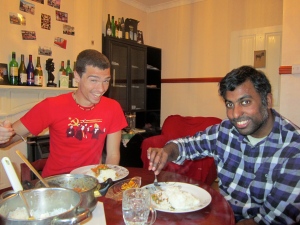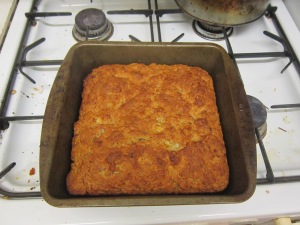If you’ve taken the challenge, or if you’re just following along with us and others who are trying to live below the line this week, you’ll be aware that there is no shortage of rules, and there’s been much discussion over what is and what isn’t allowable for Live Below the Line:
Is rummaging through the discarded pile at markets allowed (hopefully; we’ve been doing it!)?
Is it really fair to use supplies that you’d bought earlier and just subtract the percentage that you use this week from your £1 budget?
And then there’s the grey area of social capital: what if you get invited to a friend’s and they offer you something to eat, or a friend comes round to your place and brings you something, however small? Must you refuse?
But squabbling over such things seems like missing the forest for the trees, as there are some much more obvious ways that we — and I would dare to say most people taking the challenge for just one week — are cheating if we’re really trying to understand the experience of the world’s poorest people. Here are three:
1. Refrigeration. At the beginning of the week, we were able to buy a huge bag of clementines and a couple bunches of spinach for only £1 each. Of course, we knew such a large quantity would last the week because we could refrigerate them. But even in our middle-class flat in Kampala last year, refrigeration was never guaranteed, as electricity cut out almost every day. And if you have NO electricity (the situation of 1/4 of the world’s population) or are too poor to afford a refrigerator, you couldn’t buy such a large amount of produce at once, which would mean you’d have to buy smaller quantities several times, and thus, probably pay higher unit costs.
2. Baking. During our foraging, we found several brown, past-ripe bananas, which were perfect for making banana bread. Baking, in general, is a good option for Live Below The Line week because the raw materials (such as flour) are fairly cheap and you can make a large quantity. But I can count the number of ovens that I’ve seen in my wanderings through rural Laos, Uganda and Kenya on one hand; and I could do so even if I’d lost that hand in a tragic dumpster diving accident.
3. Time cost. If anything, many of us are saving money this week because of our artificially limited food budget. But since most people in extreme poverty live in rural areas, and depend on farming, the true cost of their food is the time they have to spend producing it. Conversely, we’ve spent a bit more time budgeting for the week and accounting for EVERYthing we use, plus a few more minutes foraging through East Street market (and of course, all the time and thought that’s gone in to these blog posts ;)), but for the most part, we’ve been able to go about our days as normal with very little opportunity cost.
That’s not to suggest that there’s no value in Live Below the Line or other simulations of poverty. Indeed, all this is just to highlight that what we’re experiencing this week is only scratching the surface of the struggles of legitimately poor people.
Ergo, Donate!



I remember a few times (perhaps before your time) when government officials did similar things for a month on food stamps–usually trying to show it was no big deal–and usually not really succeeding. They would do a good bit of shopping at the beginning of the month when they had all the stamps and often forget to spend on basic staples, them be unable to stretch their budget baking their own bread or having pancakes for supper. Think of your after-hours “marketing” as gleaning (or even gardening) that allows you to buy a bit extra flour or rice or whatever that usually doesn’t come in individual servings anyway.